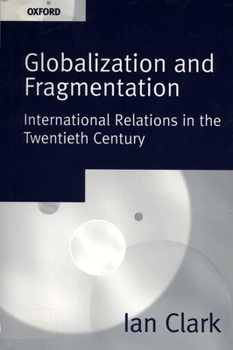Globalization and Fragmentation: International Relations in the Twentieth Century
Select Format
Select Condition 
Book Overview
As we approach the end of the twentieth century, a widespread interest in globalization is thought to be changing all economic, political, and cultural life. Ian Clark takes globalization--and its opposite, fragmentation--as the organizing theme for a grand retrospective of twentieth century international history. He argues that both globalization and fragmentation have ebbed and flowed throughout the century, governed by its great formative events: westernization, the two World Wars, the depression, and the rise and fall of the cold war. Globalization and Fragmentation sets out a challenging analysis of globalization, offering the most advanced and accessible introduction to twentieth century international relations.
Format:Paperback
Language:English
ISBN:0198781660
ISBN13:9780198781660
Release Date:June 1997
Publisher:OUP Oxford
Length:232 Pages
Weight:0.80 lbs.
Dimensions:0.6" x 6.1" x 9.2"
Customer Reviews
1 rating
A detailed historical analysis of globalization
Published by Thriftbooks.com User , 26 years ago
Reviewed by Walter de Mirci in International Relations, Volume XIV, No 1, April 1998 Globalization is perhaps one of the most debated topics of our times. Strongly defended by internationalists and criticized by those who stand to lose most by the new rules of the world game, it also creates confusion among those who experience great difficulty in understanding what globalization really means and how it affects their daily lives. Ian Clark offers a detailed historical analysis of globalization and its fragmentating effects from the pre-First World War period to the present in Globalization and Fragmentation: International Relations in the Twentieth Century. The author's main objective is to define what drives globalization forward and what globalization's effects are on those forces for fragmentation that lead to greater isolation and often to extreme nationalism. Clark gives a comprehensive and well-structured perspective clearly divided by historical period. In each chapter he identifies the main trends based on specific historical facts that led to greater globalization as well as their negative effects that gave way to fragmentation. The author's point of view is interesting in that it portrays globalization as a concept that has been evolving since the beginning of the century and not as a result of a new integration and the latest technological innovation. Clark also argues that globalization arises from evolving state political practices and thus the entire concept should not be depoliticized. In other words, globalization would not exist without the political will of nations. Although Clark rightly believes that globalization is a political process pushed forward by the most powerful states to satisfy their own interests, a concept that could have been further analysed is the effect of even greater technological change like the Internet which bypasses government regulation and is very difficult to control. Furthermore, `emerging markets' are increasingly gaining a wider share of world trade thus playing a more important role on the world stage. In Ian Clark's opinion that might simply be another step in the continuum that was initiated in the early century. The author states that fragmentary effects will always coexist with the efforts to globalization and thus constantly interact as the state is challenged from the outside because of interdependence and from the inside by the domestic constituency. He also mentions the lack of US leadership as a cause for fragmentation. Clark states that the export of American ideas and values after both the First and Second World Wars greatly contributed to globalization. However, today, there seems to be a tendency towards globalization even when the United States takes a step backward and concentrates on domestic issues. Clark believes that the formation of regional blocs can be seen as a form of fragmentation. I would suggest, however, that they represent another step towards globalization since t






